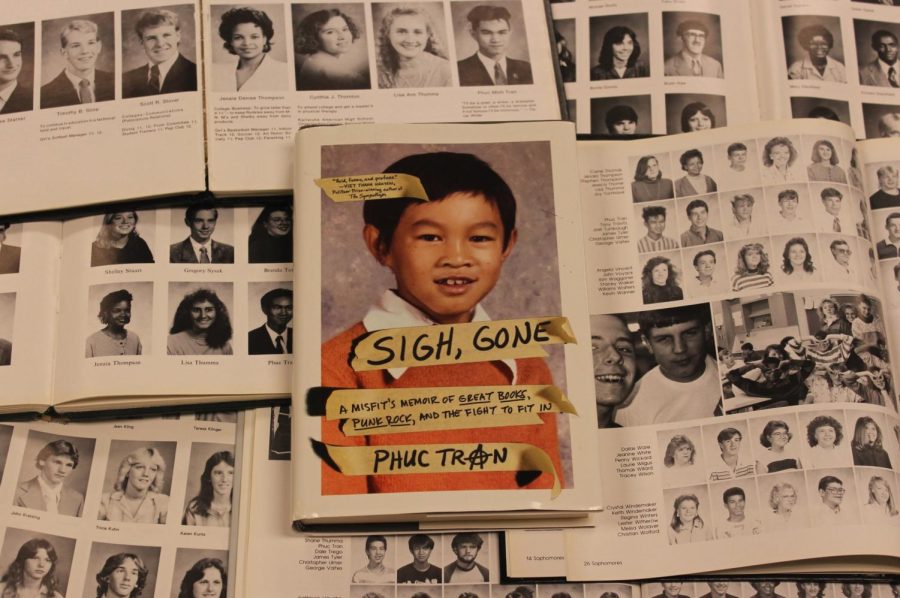Sigh, Gone- A Misfit’s Memoir by Phuc Tran: A Review of A Carlislian Author
Phuc Tran’s book among a plethora of Carlisle High School Yearbooks.
April 19, 2023
Set in Carlisle in the 1980’s, Phuc Tran’s 2020 novel is a memoir of growing up as an Asian-American punk rocker in rural Pennsylvania. Justly titled Sigh, Gone: A Misfit’s Memoir of Great Books, Punk Rock, and the Fight to Fit In, Tran discusses many of the most formative moments of his life in Carlisle. With topics ranging from a stifling relationship with his parents to considering the moral complexities of punching racists, Tran’s memoir serves as a personal time capsule, or a realistic, genuine 80’s coming-of-age novel that encompasses aspects of life that many writers of similar novels evasively dance around.
Tran gives an almost play-by-play account of what he and his family experienced as immigrants from Vietnam, his personal assimilation into American culture, and the racism Asian American people that he had to simply endure. These, alongside the other aspects of growing up that prove to be overwhelming for every child, regardless of background, make for an intense, vivacious novel that demands a second read-through.
Starting from his family’s immigration to America from Saigon, Vietnam, now Ho Chi Minh City, and progressing onward until the day of his high school graduation, Sigh, Gone follows Phuc Tran’s growth. While blatant and unafraid, discussing hard issues that persist into the modern day, Sigh, Gone also incorporates the staples of the 80’s experience, featuring the importance of clothing brands, the cliques of student stereotypes, and the vicious treatment of anyone who doesn’t fit the ‘American status quo’.
Sigh, Gone explores a smattering of topics, using vivid imagery and personal anecdotes to teleport readers into 1980’s Carlisle in all its pothole-laden, white-majority, I-81 truck stop sameness from the lens of a Vietnamese-American teenager trying to fit in. Tran keeps his audience enamored with his teenage shenanigans, enabling himself to call out the prevalent racism of the time that was (and still is) too infrequently discussed.
While immersed in the intensity of Tran’s childhood experiences, a Carlislian reader could easily imagine a black-clothed punk kid skating along Walnut Bottom Road, or voraciously checking out novel after classic novel out of the Bosler Library. Sigh, Gone gives residents of Carlisle an opportunity to see their town in a light that may be completely polar to their experience here, and it may open up their minds to accepting people and ideas that are unfamiliar. As a novel in the vast sea of novels that fill shelves all across America, it’s a valuable look into the experience of underrepresented groups in the 80’s. To readers from Carlisle, though, it serves as the perspective of a part of the history of Carlisle that often gets ignored. Besides perpetuating a cycle that is at best frustrating and at worst downright lethal, the suppression of the less than pleasant aspects of Carlisle’s history only serves to weigh down the progress and growth of its citizens. Sigh, Gone as a memoir makes the importance of acknowledging that history all the more apparent, and that makes it an important work for Carlislians to be aware of and, ideally, read.
Tran’s memoir discusses its content indelicately and somewhat indirectly, which while suiting the narrative, leads it to overlook some details that would have made Sigh, Gone more substantial. It would have been interesting to explore more of how punk rock culture imbued and influenced his life and choices, as well as its direct effect on his development as a person. The interpersonal relationships would have served well to be explored more intricately, perhaps sharing more moments of connection if there had been more to call upon. While far from being glaring issues, these things could have added another layer of connection from the story to the audience and pulled people in more acutely.
As is, Sigh, Gone is still absolutely worth a read or three, embodying many facets of teenage struggle both unique to Phuc Tran and universally applicable, offering reassurance that the fight to fit in has always been, and will always truly be, the fight to discover yourself.































































































Camera Bailey • Jun 16, 2023 at 1:03 pm
Definitely adding this to my want-to-read list immediately